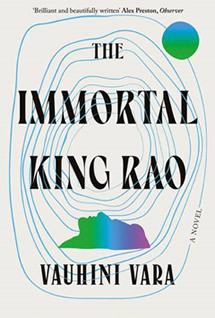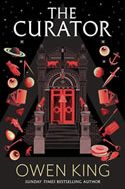Reviewed by Robert Goodman.
By Vauhini Vara, Allen and Unwin.
 Vauhini Vara’s debut novel The Immortal King Rao is daringly ambitious in scope, covering as it does about one hundred years of world history from the 1950s into a dystopian future. Over this time period she weaves together three different stories about the same man – his past, his achievements and his legacy. And while there is plenty to like about all of these stories and the way in which they are delivered, by the end the whole ends up feeling slightly less than the sum of its parts.
Vauhini Vara’s debut novel The Immortal King Rao is daringly ambitious in scope, covering as it does about one hundred years of world history from the 1950s into a dystopian future. Over this time period she weaves together three different stories about the same man – his past, his achievements and his legacy. And while there is plenty to like about all of these stories and the way in which they are delivered, by the end the whole ends up feeling slightly less than the sum of its parts.
The narrative starts both with the death of King Rao and the story of his birth in a small village in India in the 1950s. King was born into a Dalit family, untouchables who moved into business by taking over the Brahmin-run coconut business that they worked in. Over the course of the novel, Vara will follow the fortunes of this family and their coconut empire through the eyes of the young Rao. The future world in which the book opens, charmingly referred to as Hothouse Earth, is one in which governments have collapsed and all citizens (except a handful of conscientious objectors) are ‘Shareholders’ in a global government run by big business. In the middle of this is the story of how Rao came to America and was one of the founders of a massive computer business called Coconut (a thinly disguised Apple).
The story itself is narrated by Rao’s daughter Athena. Born from a stored embryo and raised on an Island (think Miranda from The Tempest), Athena tells Rao’s story from prison where she is being held for a crime that will become apparent through the telling of the tale. Athena runs away from Rao to join the ‘exes’ those who have decide not to be part of the new global “Shareholder” society.
As noted above, while the three stories are interesting in and of themselves and well told they do not connect to each other in any way that might shine a different light on them. Rao’s early life as heir to the coconut empire seems totally disconnected to the part of his career in which he becomes a software and home computer mogul. And besides the fact that Rao championed the technology that has led to the future seemingly dystopian world, he is not really around to consider the personal consequences.
All this to say that The Immortal King Rao is an interesting book and a skilful debut which delivers three engaging narrative strands and some memorable characters. The narrative always seems to be on the verge of bringing the enterprise together with a couple of ‘ah ha’ moments. But the three strands never really cohere into a satisfying whole.
Over 800 more book reviews can be found on Pile by the Bed.











